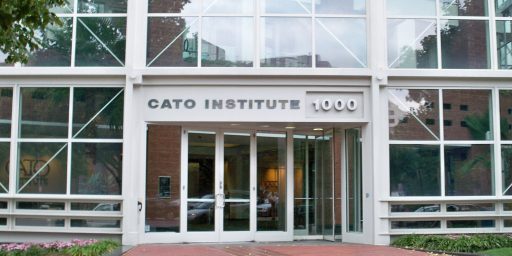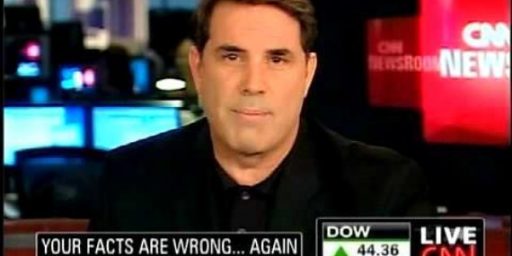Cato Koch Fight
People are seeing irony where it doesn't exist.
Reading the comments to Doug Mataconis’ posting “Battle For Control Of Cato Institute Reveals Conservative-Libertarian Divide” I see a lot of comments along the lines of Brad DeLong‘s snark that, “The Kochs’ point of view is simple: since William Niskanen’s death the shareholders’ agreement says that they own a majority of the shares of Cato, and it is their property with which they can do as they wish. It is hard to see how any true libertarian could possibly disagree, and seek to do anything other than to vindicate the Kochs’ liberty interest in what is their property.”
But I’m not seeing anyone argue to the contrary. Not Julian Sanchez. Not any of the dozen-plus commentators that DeLong rounds up and consumes with “delicious irony” on the grounds that they “are not libertarian but rather Burkean, communitarian, and social democratic ones, and thus arguments that no true libertarian could ever possibly make.” Libertarianism, at least in its Cato-style American form, is about the relationship between man and the state. Most libertarians would bitterly oppose government action to prevent the brothers Koch from turning Cato into a Republican hack shop.* None who are bemoaning the possibility of that becoming Cato’s fate would dispute that, if the Kochs indeed have a controlling interest, they have every right to fire every independent thinking employee who fails to hew to the party line. Sanchez, for one, cheerily concedes that point.
One can simultaneously believe in someone’s right to do something without interference from government and yet think it would be an unfortunate outcome. And that’s all that’s being claimed in this debate: that it would be a damned shame if the Cato Institute, which has been a big tent for really bright libertarian minds to conduct research and write within the broad rubric of libertarian thought, were to suddenly become just another outlet for cranking out partisan talking points.
Now, I tend to shy away from citing studies coming out of places like Cato even now. While their scholars are smart, rigorous, and fair, they have an agenda. Saying “a Cato Institute study finds” therefore adds nothing to one’s argument–unless it’s in the form “even the libertarian Cato Institute . . . .” But at least the work has been useful as background reading or in an intra-libertarian dispute. If the Kochs have their way, that will cease to be the case.
I’ve also seen some commentary along the lines of “well, what did you expect”? The problem with that is that the Kochs were among Cato’s founding benefactors. In 1974. If they intended this all along, that’s a long game, indeed.
________________
*Doing so, depending on the implementation, might put in jeopardy Cato’s tax exempt status. But that’s a different matter.





I thought that Koch-fighting was against the law. 😉
Are you serious JJ? On economic issues I’ve never seen it do anything other than crank out partisan talking points. Why the heck do you think the Koch’s funded it in the first place. In it’s early days it actually called the Koch institute or something similar. Essentially it’s goals are no different than Heritage, AEI, Manhattan and all the rest of them. And as you point out JJ De Long’s snark is literally on the money. Cato is actually the property of the Koch’s.
@Brummagem Joe:
What’s happened is that the GOP has become increasingly economically libertarian since 1980 or so. But Cato is a libertarian ideas shop, not a Republican organ. Heritage, I’d argue, has become more Republican even at the cost of redefining its vision of conservatism. But Cato has all manner of leftist ideas on drugs, war, law enforcement, etc.
The last is apparently true–although it wasn’t until a couple months ago. But I don’t disagree with DeLong on that point, just on the non-existent “irony” of Cato backers opposing the direction the Kochs want to take it.
Nah. The Kochs didn’t intend this back in 1974. They’ve only plotted this for five, six years at best. The Kochs seem to perceive our current times as apocalyptic in some fashion.
The reason to call such a thing “Cato” and not “Koch brothers think ….” is that it builds a brand and authority broader than them.
Minutia of ownership are pure distractions.
The bottom line is whether they can keep enough reputation alive to keep Cato a “think tank” and not a “PR agency.”
@James Joyner:
Oh I think irony was entirely the right word given libertarian’s attachment to the prerogatives of ownership. His list of the usual suspects and their varying positions was not without it’s element of unconscious humor.
JJ…this is worth a read if for nothing else than the comment on the sublime genius of Dubya
http://volokh.com/2012/03/03/koch-v-cato-a-view-from-cato/
Here it is in a nutshell: Ed Crane and Charles Koch had a personal falling out years ago. Crane wants to retain control of Cato through an illegitimate transfer of William Niskasen’s voting shares to his widow. The corporate charter for Cato forbids this—and Ed Crane personally signed this charter back in the 70’s when the organization went from being the Charles G. Koch Foundation to Cato. Now Crane wants to pretend that the corporate charter he signed is defunct or irrelevant. Charles is pressing his rights under the corporate charter to get back control of board seats he is entitled to and Crane is resisting, predictably using every tool at his disposal, including stirring up the libertarian community by raising the specter of a Republican finger reaching into Cato’s objectivist garden. Charles offered three or more ways to resolve this, but Ed Crane is the one that forced this to a crisis by rejecting every effort at compromise, categorically. It’s a straightforward question of enforcing one’s rights under an agreement, and Crane should be ashamed for playing the tactic of smearing Charles by dressing this up as an ideological takeover of Cato to do GOP bidding. It’s not that at all, but the accusation conveniently aligns with all the “Koch=evil” media narratives that are out there. But hey, when you’re cornered, desperate, factually and legally wrong, you’ll use whatever you can…including a stab in the back to the guy who launched your career.
@Brummagem Joe:
Sir, you should learn the difference between the plural and the possessive. It will make you more persuasive, I promise. /ProTip